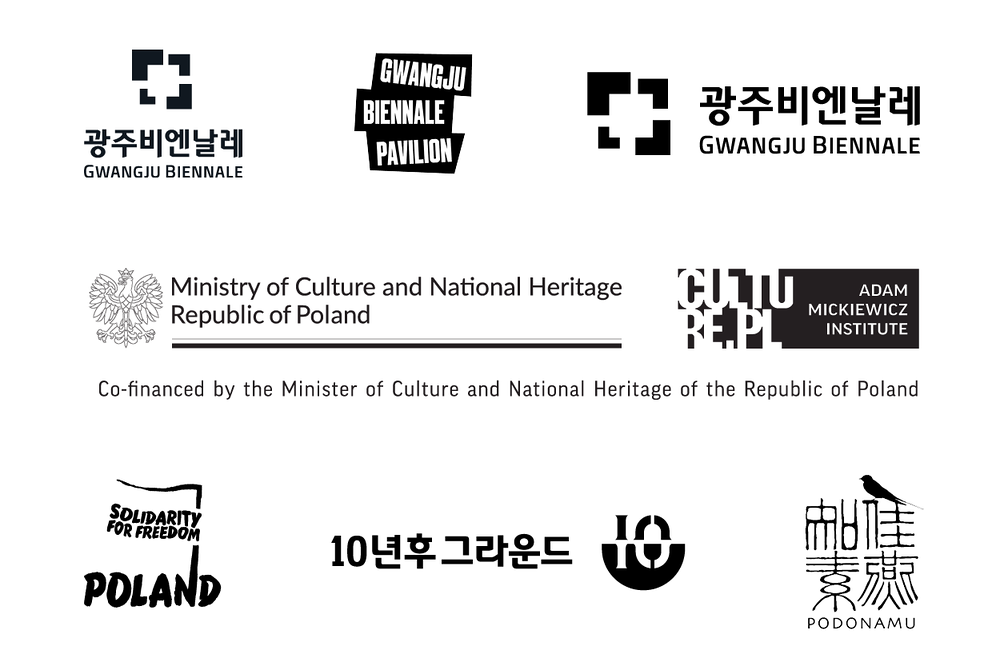A public gathering on art beyond art
May 5–7, 2023
Gallery Podonamu, Gwangju
Postartistic Assembly is a public programme consisting of lectures, screenings, performances, workshops, and sound installations. It will be presented, over the course of three days, by the Adam Mickiewicz Institute at the Polish Pavilion at the 14th Gwangju Biennale, alongside the latter’s main exhibition, soft and weak like water, investigating art that becomes a part of other ecosystems: climate activism, agriculture, choreography or experimental pedagogies.
Postartistic Assembly draws upon the artistic tradition associated with the Polish theorist Jerzy Ludwiński (1930–2000). Ludwiński assumed that we were living in a “postartistic era” and maintained that we had to be ready for an entirely new kind of art. “Perhaps, even today, we do not deal with art. We might have overlooked the moment when it transformed itself into something else, something which we cannot yet name. It is certain, however, that what we deal with offers greater possibilities,” he wrote in 1972. In the local context, the assembly is a reference to the artistic work of Heo Baek-ryeon (1891–1977), the Korean painter, poet, and calligrapher working under the pseudonym of Uijae. In the 1940s, resulting from his fascination with landscape and collective work, Heo Baek-ryeon founded an agriculture-based school Samaehakwon, where local leaders, artists, and farmers were educated.
Instead of distinguishing between what is, and what is not considered art, the participants of Postartistic Assembly explore what can be done with art today. Olga Micińska uses the method of “hacking” the functions of existing objects. Alicja Czyczel’s vocal and choreographic performance relies on the participation of a river, storm, cornfield, combine harvester, and crickets. Jaśmina Wójcik’s film is a documentation of actions carried out together with the community of employees of the now defunct Ursus tractor factory. Antonina Nowacka experiments with electronics, the sounds of speech apparatus, and non-verbal communication. Centrala addresses the relationship between the city and water and present their methodology, based on, among others, walks, art installations, and material research. Pola Sutryk proposes a collaborative sensory experience based on the physiology of taste and mechanics of flavour. Rice Brewing Sisters Club focuses on the act of making nuruk (Korean yeast) and seokkeottuiumbi (compost that uses indigenous microorganisms). Jeamin Cha presents a film about the relationship between people and trees in South Korea. Paweł Kulczyński explores sonic interconnections between human-made soundscapes and nature within the climate crisis context, and explores the soundscape of Mudeungsan mountain area. ikkibawiKrrr presents works focusing on seaweed, focusing on the haenyeo, female divers who harvest marine molluscs and plants. Alicja Rogalska’s film documents a dinner ritual commemorating the end of humanity’s reliance on fossil fuels. CentrumCentrum presents a documentation of an earlier postartistic assembly, which took place in Sokołowsko, Poland in 2021.
As a part of the Postartistic Assembly, a programme of films by Freefilmers collective (Mariupol, Ukraine) is presented at Podonamu gallery in Gwangju. At the start of the full-scale Russian invasion of Ukraine and the occupation of Mariupol, Freefilmers adapted their artistic network to the needs of war. They accumulate funds to support artists, queer activists, and neurodivergent people, and the most vulnerable communities in regions most affected by war. The programme was curated in collaboration with the Ukrainian curator and researcher, Asia Tsisar.
Participating artists and collectives: Centrala (Małgorzata Kuciewicz and Simone De Iacobis), CentrumCentrum (Małgorzata Mazur and Łukasz Jastrubczak), Jeamin Cha, Alicja Czyczel, ikkibawiKrrr (Jungwon Kim, Jieun Cho and Gyeol Ko), Paweł Kulczyński, Olga Micińska, Antonina Nowacka, Rice Brewing Sisters Club (Hyemin Son and Soyoon Ryu), Alicja Rogalska, Pola Sutryk, Jaśmina Wójcik and the Freefilmers collective (works by Vasyl’ Lyah, Sashko Protyah and Vasyl’ Tkachenko, Sashko Protyah and Oksana Kazmina, Oleksandr Surovtsov, Natasha Tzeliuba).
The Assembly is convened by Sebastian Cichocki and Marianna Dobkowska, the founding members of the Office for Postartistic Services—a network of art workers contributing to the pro-democratic political struggles and social movements.
The project is organised by the Adam Mickiewicz Institute.
Hosted by Gwangju Biennale Foundation, Gwangju Metropolitan City.
Partners: 10Yground and Gallery Podonamu


